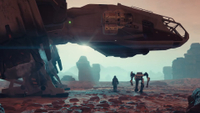Todd Howard says you'll never run out of fuel in Starfield because it's a 'fun killer'
They've "dialled back" the survival elements that were initially too hardcore.
Todd Howard has given a wide-ranging interview on the Lex Fridman podcast, during which he talked a little more about Bethesda's upcoming Starfield, which following a delay is set for release early next year. I'm still just expecting this to be Skyrim in space, and I'll play the hell out of it, but Howard gives a little more detail on how the star systems will be structured and some of the things that were "dialled back" for being too hardcore.
On the game's number of 1000 planets, Howard says that's all about having "a set we can validate and know about." With Bethesda's technology they could have generated as many as they wanted: "a hundred planets or a thousand or a million, you just change the number, press the button." But Howard says this means you can't know what the experience will be like for anyone landing on those planets, which may well be taken by some as a not-so-coded reference to No Man's Sky.
As for the feel of piloting in space, the game's intended to communicate that this is a hard thing to do without constantly killing the player. "We've dialled it back," said Howard. "You used to run out of fuel, jump out, you get stranded: on paper it's a great moment."
When this happened players had to call a beacon and wait to see who'd turn up. But what Bethesda designers found when playing the game was that every so often you'd accidentally run out of fuel… and then you'd just end up exploring nearby planets, and mining to try and find fuel. "It's a fun killer."
Howard does note that Bethesda may return to some of these ideas post-launch with some sort of more hardcore survival mode.
As for the systems themselves, they'll be structured in the same way that a lot of RPGs traditionally approach world-arranging. "We do level the systems, when you enter you'll see like this is a level 40 system," said Howard. "Like when you look at a map in a game it says 'this is the area for low level' basis, so we do that on a system basis."
Other tidbits: different space suits will have different tolerances for atmospheric conditions like toxicity and temperature, so some will be more useful than others. There are enemy robots out in space! Though most robots are utility robots. Other ships will come and go from starports, and can make contact with you. Howard also refers to Starfield as a "platform seller" in which context, of course, delaying the game was "tough" but also "the right thing to do".
Keep up to date with the most important stories and the best deals, as picked by the PC Gamer team.
There's also a part where Howard says he personally prefers gaming on console in his leisure time, purely because he works in front of a PC all day. We'll skip that one over shall we. Et tu, Toddy?
Finally, Howard claims that Starfield's planets have their own orbits and move around the sky: which I will say is cool as hell, and let's wait to see what it means in practice. Bethesda's marketing for this has all been a bit fuzzy so far, but there's still a lot of solid details about what will hopefully be one of next year's biggest hitters: here's everything we know about Starfield.
Starfield factions: Find a cause to quest for
Starfield cities: See the big spaces in space
Starfield companions: Collect cosmic comrades
Starfield traits: Give your hero some history
Starfield ship customization: Make your spaceship special

Rich is a games journalist with 15 years' experience, beginning his career on Edge magazine before working for a wide range of outlets, including Ars Technica, Eurogamer, GamesRadar+, Gamespot, the Guardian, IGN, the New Statesman, Polygon, and Vice. He was the editor of Kotaku UK, the UK arm of Kotaku, for three years before joining PC Gamer. He is the author of a Brief History of Video Games, a full history of the medium, which the Midwest Book Review described as "[a] must-read for serious minded game historians and curious video game connoisseurs alike."


